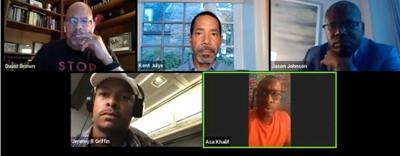“Gun Violence Triggered by White Supremacy: Where Do We Go From Here?” was the topic of this year’s 14th annual Global Citizen 365 Beer Summit conversation about race, class and power.
The virtual event included special guests author and MSNBC analyst Jason Johnson, Black Lives Matter movement activist Asa Khalif and Kent Julye, father of Zachariah Julye, a 19-year-old male who was shot and killed July 2 in Philadelphia.
“At the same time, as the eyes of the nation were transfixed on this gathering at the White House. We decided to do our own beer summit conversation in Philadelphia,” said Todd Bernstein, president of Global Citizen 365. “David Brown moderated that 13 years ago, and we had been doing this ever since but also as part of a series of conversations on race, class and power.
“Tonight our theme is gun violence triggered by white supremacy: where do we go from here which is taken from the words of Dr. (Martin Luther) King. The conversation is an opportunity to both discuss these critical issues and to hear from our special guests.”
The Global Citizen 365 Annual Beer Summit marks the anniversary of the 2009 arrest of Harvard professor Henry Louis Gates by Cambridge Police sergeant James Crowley.
However, the replica of the beer summit hosted at the White House by former President Barack Obama following Gates’ unwarranted arrest on his front porch has since gained momentum bringing more citizens together each year to find viable solutions to the city’s ills.
The Rev. David Brown, a Temple University professor, moderated the conversation.
“We’re going to talk about perspectives,” Brown said. “The whole notion of the beer summit is to bring different people from different perspectives along in focusing on a common challenge within the community.”
Each guest weighed in on how they felt about white supremacy in relation to gun violence and what needs to be done internally within communities that are afflicted by crime and gun violence.
“What concerns me most about this is not that we’ve seen an increase in white nationalist violence, the greatest amount of domestic terrorism is from white people,” Johnson said.
Johnson referenced a study that came out last week about the demographics of the people who are leading these (white supremacy) movements and who were a part of the Jan. 6 insurrection at the White House to explain his growing concern.
“Ninety-three percent of the people involved in Jan. 6 are white over 50% of the people are CEOs or business owners, over 30% of them are former military or law enforcement. And the greatest indicator of somebody involved in the Jan. 6 attack is somebody from a county where Joe Biden won in the 2020 election and that has also seen a decrease in its white population over the last decade,” Johnson said.
“So we know where this is coming from. And the question that we really have to face in this country right now is if we’re not going to get rid of the guns, then we have to do something about the people who are using the guns. And if we’re not going to do something about the people who are using the guns then we got to get rid of the guns. If we do not. We are settling in for a cycle of violence, for the last of which we saw about 100 years ago.”
According to Khalif, the lost sense of togetherness and the foundation of community are major contributing factors in this uptick in gun violence in African-American communities.
“There’s a whole lot going on with this topic, gun violence triggered by white supremacy. I want to break it down and say that first of all, Black and brown bodies have never been safe here in America ever,” Khalif said. “We’ve always been targeted. But I feel that we have lost generationally, the spirit of family and the spirit of bonding together and looking out for one another.”
Khalif, is a racial justice leader who was instrumental in bringing the Black Lives Matter movement to the Philadelphia region.
“Respect used to be passed on from generations,” Khalif said.
He added that the lack of care for one another “is not where we come from. ... We have to bridge the gap when parents are absent.”
Many interesting points were raised during the 90-minute discussion. However, panelists acknowledged that there might not be one perfect solution to ending gun violence.
Panelists suggested that there are multiple factors and layers to the issue at hand, it may take a series of different solution-based citizen actions to uplift communities.
As Brown brought the conversation to a close, he reiterated that there is work to be done on the political and community levels. He challenged everyone to consider how to use self-interest to move the needle on gun violence in Philadelphia.








(0) comments
Welcome to the discussion.
Log In
Keep it Clean. Please avoid obscene, vulgar, lewd, racist or sexually-oriented language.
PLEASE TURN OFF YOUR CAPS LOCK.
Don't Threaten. Threats of harming another person will not be tolerated.
Be Truthful. Don't knowingly lie about anyone or anything.
Be Nice. No racism, sexism or any sort of -ism that is degrading to another person.
Be Proactive. Use the 'Report' link on each comment to let us know of abusive posts.
Share with Us. We'd love to hear eyewitness accounts, the history behind an article.